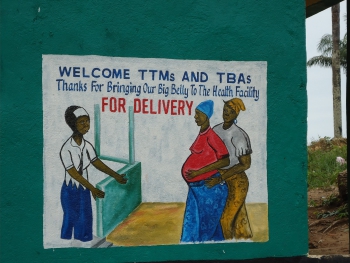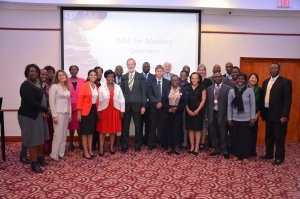Decreasing Maternal Mortality in Africa Is the Objective for UMSN Professor
Dr. Jody Lori is building on previous success in Liberia for an endeavor in Zambia aimed at providing mothers with a safe place to give birth.
“Zambia has one of the highest rates of maternal deaths in the world,” says University of Michigan School of Nursing (UMSN) Clinical Associate Professor Jody Lori, Ph.D., CNM, FACNM, FAAN. “Many women choose to have home births, but if there is a complication they usu ally can’t get help in time. Maternal Waiting Homes (MWHs) provide a safe place for pregnant women to stay before labor begins to ensure proper care leading up to, during, and after delivery.”
ally can’t get help in time. Maternal Waiting Homes (MWHs) provide a safe place for pregnant women to stay before labor begins to ensure proper care leading up to, during, and after delivery.”
Dr. Lori and UMSN’s Deborah J. Oakley Collegiate Professor Carol Boyd, Ph.D., RN, FAAN, are working with Africare, a non-governmental organization focused on improving the health and sustainability of communities, along with Safe Motherhood Action Groups (SMAGs) and the Ministry of Community Development, Mother and Child Health in Zambia. Their evidence-based prop osal, "It Takes a Village: Maternity Waiting Homes in Zambia," received one of the three grants awarded by Merck for Mothers.
osal, "It Takes a Village: Maternity Waiting Homes in Zambia," received one of the three grants awarded by Merck for Mothers.
Many women in Zambia opt for home births because of the distance and difficulty getting to a health care facility. However, as the proposal explains, the majority of maternal deaths are the result of conditions that are “largely preventable with appropriate and timely care during labor.” Delays caused by the mothers postponing seeking help, traveling through difficult terrain, and even waiting at the care facility compound health dangers.
Dr. Lori and her colleagues plan to evaluate the acceptability, feasibility, and sustainability of MWHs. “We need to look at questions such as ‘What is the level of local commitment to a MWH?’” says Dr. Lori. “Who are the community leaders and stakeholders that will participate in decision making? What type of participation is available to sustain the MWH once they are established?”
 Dr. Lori has led a similar initiative in Liberia with successful results and believes the knowledge and experience gained in that project will be very beneficial in Zambia. “We learned so much about building and sustaining MWHs in that process and we can bring that knowledge to Zambia. We have specific strategies like building a sense of community ownership in MWHs, utilizing SMAGs to increase health seeking behavior around childbirth, and establishing community-supported income-generating activities.”
Dr. Lori has led a similar initiative in Liberia with successful results and believes the knowledge and experience gained in that project will be very beneficial in Zambia. “We learned so much about building and sustaining MWHs in that process and we can bring that knowledge to Zambia. We have specific strategies like building a sense of community ownership in MWHs, utilizing SMAGs to increase health seeking behavior around childbirth, and establishing community-supported income-generating activities.”
Financial sustainability is essential to the success of the MWH model. Dr. Lori says part of  the process includes linking income-generating activities, such as operating a garden, to the MWH. The garden will provide nutrition to the expectant mothers while the extra crops can be sold to raise money for the MWH. Other activities such as running a small supply shop or flour mill will also be evaluated.
the process includes linking income-generating activities, such as operating a garden, to the MWH. The garden will provide nutrition to the expectant mothers while the extra crops can be sold to raise money for the MWH. Other activities such as running a small supply shop or flour mill will also be evaluated.
Dr. Lori recently attended a kick-off event with Merck for Mothers in Zambia and expects to return again in July. She and her colleagues will train a local team for data collection, and evaluate facilities. They will also conduct individual interviews and hold focus groups with women of reproductive age, husbands, health care providers, and community leaders. The project is scheduled to take nine months.





